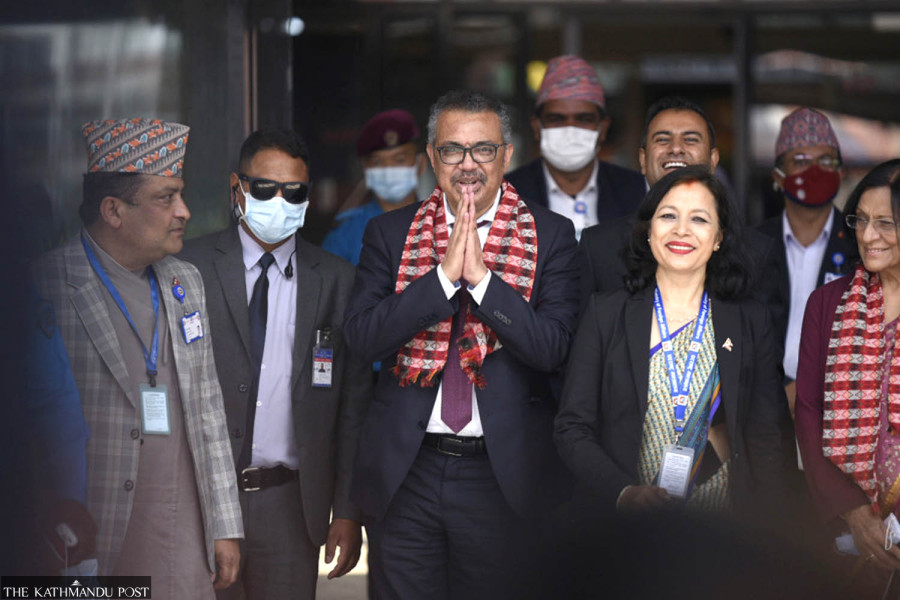Health
Nepal seeks WHO’s help to develop it as regional hub for tropical medicine
Nepal discusses HPV vaccine and support for fighting non-communicable diseases with visiting WHO chief.
Arjun Poudel
Nepal has sought the World Health Organisation’s support to develop the country as a regional hub for tropical medicine.
During a meeting with WHO Director General Dr Tedros Adhanom Ghebreyesus on Thursday, Minister for Health and Population Birodh Khatiwada made a request for the UN health agency’s support to develop the Hetauda-based Vector-borne Disease Research and Training Center as a hub for tropical medicine of the South-East Asian region.
Tedros arrived in Kathmandu on Thursday for a three-day visit.
“WHO officials were positive about Minister Khatiwada’s proposal,” Dr Ramesh Dhakal, an expert advisor to the health minister, told the Post. “They (WHO officials) have assured us that they will deploy a team to study the possibility for the same.”
During the meeting, Nepali officials also inquired with Tedros and his team about Nepal’s low representation in leadership roles in country offices, regional offices and central office of the UN health agency.
“We asked WHO officials why aren’t more Nepali nationals in leading positions in WHO offices despite having good qualifications,” Dhakal said.
Their response was, according to Nepali officials, that many Nepalis are already employed in the UN’s health offices.
Vaccines against the human papillomavirus infection, support for fighting the burden of non-communicable diseases, and Covid-19 jabs for children aged 5-11 years among other issues were raised by Nepal during the meeting, said officials.
A 2019 study on the prevalence of non-communicable diseases (NCD) by Nepal Health Research Council found that NCDs are responsible for 71 percent of total deaths in the country. The findings showed that the leading risk factor of deaths in 2019 was smoking, whose attributable death was 17.7 percent, followed by high systolic blood pressure (12.3 percent), household air pollution (11.2 percent), ambient air pollution (9.3 percent), diabetes (8 percent) and high cholesterol and kidney dysfunction, among others.
Likewise, Nepal’s plan to launch a vaccination drive against human papillomavirus in some districts of the country from the ongoing fiscal year has been halted indefinitely due to a lack of funds to purchase doses.
The human papillomavirus (HPV) causes cervical cancer and is a major cause of deaths among women in Nepal. The WHO says HPV vaccination is recommended as part of a coordinated and comprehensive strategy to prevent cervical cancer and other diseases caused by the HPV.
“The WHO is positive to Nepal’s request for help in supplying the vaccine against human papillomavirus infection and Covid-19 jabs for children aged 5-11 years,” said an official at the Health Ministry, who took part in the meeting with WHO officials. “We also apprised them of the growing prevalence of other non-communicable diseases—cancer, mental health and others.”
Nepali officials say that the government’s plan to vaccinate children aged five to 11 years against Covid-19 could face a setback because of a resource crunch.
They said that they are weighing options—whether to procure vaccine doses or wait for COVAX, the United Nations-backed international vaccine sharing scheme, and other aid agencies to provide the doses for free.
The WHO officials lauded Nepal’s success in the vaccination drive against Covid-19, officials said.
Even if Nepal’s Covid-19 vaccination was a successful drive, the coronavirus pandemic affected the overall progress made in the healthcare sector. It would take years to recover some of the progress while the country is not positioned to achieve some of the Sustainable Development Goal targets.
WHO South-East Asia Region Office’s head Dr Poonam Khetrapal Singh, WHO Nepal chief Dr Rajesh Sambhajirao Pandav, Shambhu Acharya, director of Country Cooperation and Collaboration with the UN System accompanied Tedros in the meeting.
State Minister for Health and Population Bhawani Prasad Khapung, secretaries Dr Roshan Pokhrel and Dev Kumari Guragain, and Health Minister’s expert advisor Dhakal took part in the meeting with WHO officials.
Tedros arrived in Nepal after completing a three-day visit to India.
The Health Ministry said that Tedros will visit Sukraraj Tropical and Infectious Disease Hospital, National Public Health Laboratory and attend a typhoid vaccination programme in a school at Patan Durbar Square.
Tedros will also pay a courtesy call on President Bidya Devi Bhandari, Prime Minister Sher Bahadur Deuba and Minister for Foreign Affairs Narayan Khadka.
Tedros’ visit comes ahead of the 75th World Health Assembly set to be held in May 2022, which will elect a new director general. Tedros is eligible for a second five-year term.
Nepal has proposed Sambhu Acharya, who is accompanying Tedros, as a candidate for chief of the WHO South-East Asia Region. Acharya is director of Country Cooperation and Collaboration with the UN System.
Election of the WHO’s regional governing body is scheduled to be held in 2023.
Dr Poonam Khetrapal Singh currently oversees the South-East Asia region from the WHO’s New Delhi office.




 17.12°C Kathmandu
17.12°C Kathmandu














